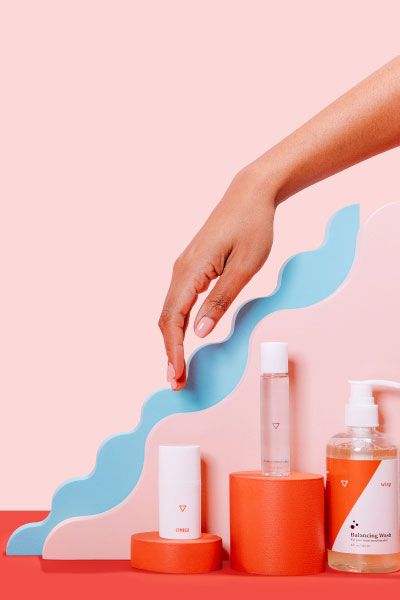
How To Treat Pain & Dryness
During Sex (Dyspareunia)
What is Dyspareunia?
Dyspareunia is the medical term for any type of recurring genital or pelvic pain during sexual intercourse. It’s often caused by friction and dryness during sex, but it can have many different causes. This term covers many different types of pain (external or internal, sharp or dull, etc.) and it covers pain that occurs before, during, or after the act of sex. Dyspareunia doesn’t necessarily speak to the cause of your pain, but it’s a useful term to use when communicating your symptoms to your doctor or when researching possible treatments.
Dyspareunia Symptoms
Dyspareunia is an umbrella term that can describe all kinds of painful sexual intercourse. It is important to note that if you are experiencing any type of pain during sex, you should discuss it with a doctor. Pain can be a warning sign of a serious health concern. Plus, you deserve to have pain-free sex! Vaginal pain during sex is never normal, and it certainly isn’t something you should be expected to endure (don’t believe anyone who says otherwise). Here are a few ways pain may present itself if you are struggling with dyspareunia:
- In the vagina, urethra, or bladder
- During penetration, or during or after intercourse
- Deep in the pelvis during intercourse
- After pain-free intercourse
- Only with specific partners or circumstances
- With tampon use
- Along with burning, itching, or aching
- With a feeling of stabbing pain, similar to menstrual cramps
Let your doctor know about the specific type of pain you are experiencing so they can help you identify the root cause.
What Causes Dyspareunia?
There are a number of different factors that may contribute to recurring feelings of pain during sex. We know dyspareunia affects people with vaginas more often than people with penises and this is likely due to a combination of biological and social factors.
Common physical causes include:
- Vaginal dryness during sex from hormonal changes (like menopause, childbirth, and breastfeeding), new medications, or a lack of arousal before or during sex.
- Health concerns that affect the skin and/or genitals like ulcers and cracks (exacerbated by vaginal dryness during intercourse), or infections like yeast infections, urinary tract infections (UTIs), and bacterial vaginosis (BV).
- Pelvic conditions that cause internal pain like endometriosis, pelvic inflammatory disease (PID), uterine fibroids, or cystitis.
- Vaginismus, a condition where the vaginal muscles spontaneously tighten and make any kind of insertion very painful and difficult.
Painful sex can also be caused by psychological and emotional factors that affect your sex drive or ability to become aroused.
Common psychological factors include:
- Chronic stress that leads to overly tight pelvic floor muscles.
- Relationship problems that lead to tension between you and your sexual partner.
- Feelings of fear or shame around sex that may be linked to a history of trauma or abuse, or a cultural upbringing that enforced many sexual taboos.
- Body image insecurity or dysphoria that makes you feel uncomfortable in your own body (this includes gender dysphoria, a feeling that your body and/or genitals do not match your gender identity).
The Best Treatment for Painful Sex
Treatment for dyspareunia often depends on treating the underlying cause of your pain. You can sign up for wispcare to talk over your symptoms with a doctor who can walk you through treatment options. If your doctor determines you have a vaginal infection, prescription antibiotics or antifungals will be the first step in getting back to healthy. Pain stemming from psychological factors may be best addressed with talk therapy, or a combination or talk therapy and physical therapy that targets pelvic floor muscles.
How to Treat Vaginal Dryness
The hormonal changes that occur during and after menopause can lead to uncomfortable vaginal dryness, as well as an increase in UTI symptoms and discomfort or pain during sex. In fact, research suggests that 84% of women experience genitourinary syndrome of menopause, a chronic, progressive, vulvovaginal, sexual, and lower urinary tract condition that causes a variety of uncomfortable symptoms, including vaginal dryness and UTI symptoms. Additionally, 55% of post-menopausal women experience recurring UTIs. Treatment with vaginal estrogen like Estradiol Cream can be an effective way to address the root cause of recurring UTIs and dryness by improving the quality of vaginal tissue and preventing future infections!
Hormonal options aren't always a fit for everyone. If you're looking for a non-hormonal treatment option for vaginal dryness, Non-Hormonal Vaginal Moisturizer may work for you! Our Vaginal Moisturizer is for anyone experiencing vaginal dryness, suitable for all life stages, including breastfeeding, postpartum, and menopause/perimenopause. This fast-acting, hormone-free option is a safe and effective alternative to Estradiol Vaginal Cream, or can be used in conjunction with Estradiol Vaginal Cream for quicker symptom relief. Non-Hormonal Vaginal Moisturizer can be a great option for those experiencing vaginal dryness as a result of a new medication, like cold and allergy meds, antidepressants, and birth control pills that can all lead to some discomfort down there.
If you’re experiencing vaginal dryness, lube can also be a great tool in your treatment regimen! It reduces friction during any kind of sexual penetration, but there are many different types of lube out there. You’ll want to be sure to choose one with body-safe ingredients that won’t irritate your skin or lead to a vaginal infection. If you are recovering from an infection, lube can help facilitate a healthy and pleasurable rebound! Wisp has developed a silicone-based Harmonizing Lube that’s doctor-formulated to be hypoallergenic and gentle on sensitive skin — no need to wonder what to use for dryness during intercourse 😉 Use it for extra slip and comfort to make sex easier, more pleasurable, and more fun.